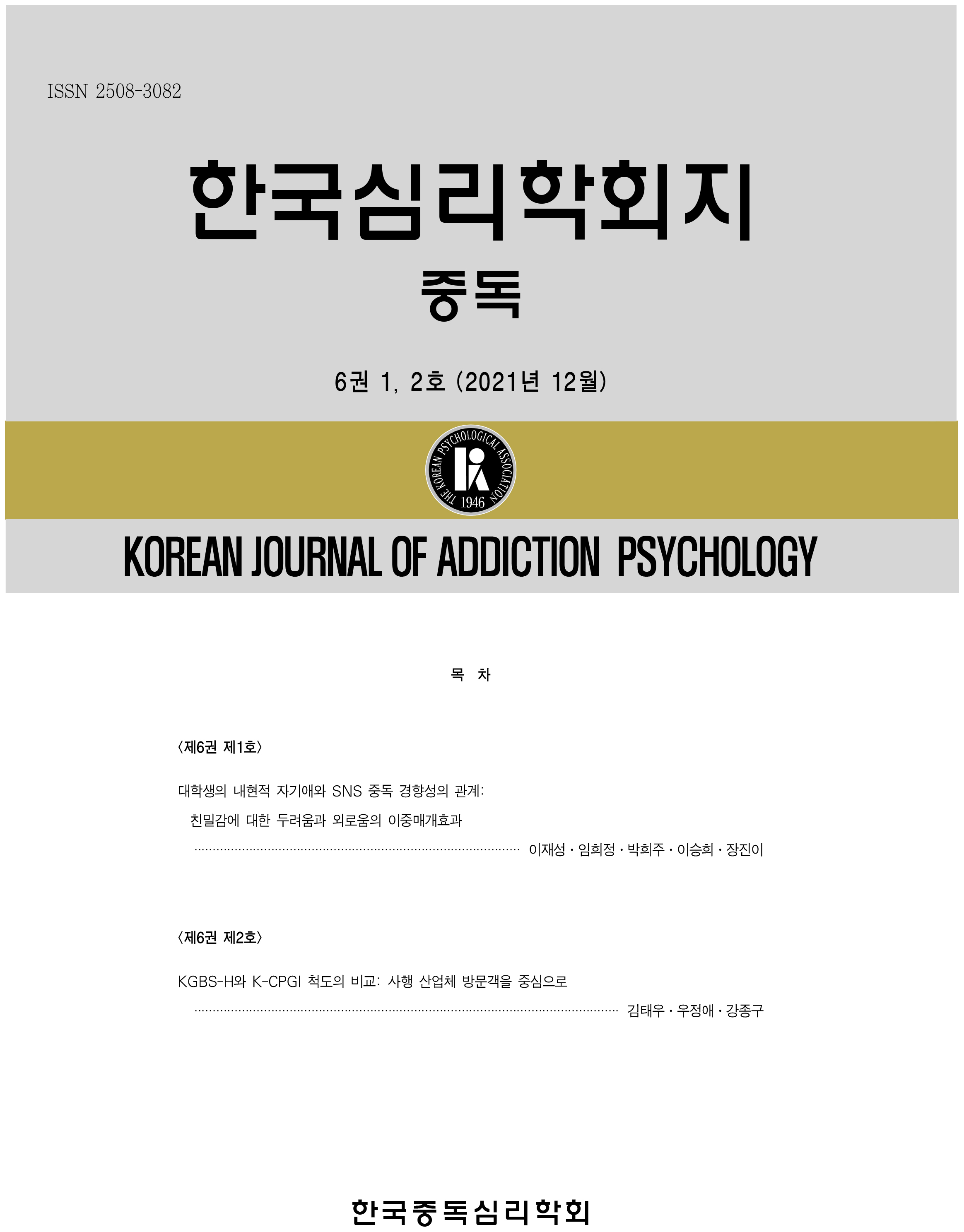도박중독자 가족의 심리적 적응을 위한 긍정심리기반 음악치료 프로그램 개발 및 효과 검증
The Effect of Positive Psychology-Based Music Therapy on the Emotional Adaptation of Gambling Addicts' Families
이에스더(Esther Rhee) (계명대학교 예술치료학과)
윤혜영(Hyae Young Yoon) (계명대학교 심리학과)

초록
본 연구에서는 도박중독자 가족의 심리적 적응을 위한 긍정심리기반 음악치료프로그램을 개발하고 그 효과를 알아보고자 하였다. 이를 위해 도박문제관련 상담센터를 이용하고 있는 도박중독자 가족과 단도박가족모임(GAM-ANON; 이하 GA)에 참여하고 있는 도박중독자 가족들을 대상으로 연구를 진행하였다. 실험집단(n=9)은 8회기의 긍정심리기반 음악치료 프로그램에 참여하였으며, 통제집단(n=10)은 도박문제관련 상담센터의 8회기 개인상담을 받도록 하였다. 치료 효과를 확인하기 위해 긍정정서 부정정서 척도(Positive Affect Negative Affect Scale; 이하 PANAS), 우울척도(Center for Epidemiologic Studies Depression Scale; 이하 CES-D), 지각된 스트레스 척도(Perceived Stress Scale; 이하 PSS), 긍정적 사고 척도(Positive Thinking Scale; 이하 PTS)를 측정하였다. 연구결과, 긍정심리기반 음악치료프로그램에 참여한 실험집단은 통제집단에 비하여 긍정정서, 긍정적 사고가 유의하게 증가하였고, 부정정서, 우울, 지각된 스트레스가 유의하게 감소하였다. 이는 긍정심리기반 음악치료가 도박중독자 가족의 심리적 적응에 효과적일 수 있음을 시사한다.
- keywords
- 도박중독, 도박중독자 가족, 심리적 적응, 긍정심리치료, 음악치료
Abstract
This research aimed to develop and prove the effect of a positive psychology-based music therapy program for the emotional adaptation of gambling addicts' families. The research subjects were selected gambling addicts' families who were visiting a counselling center for gambling related problems as well as members of a GA family support group. The experimental group(n=9) received a 90- minute weekly session of positive psychology-based music therapy 8 times, while the control group(n=10) received 8 sessions of personal counselling at a counselling center for gambling-related problems. The measurement tools included PANAS(Positive Affect Negative Affect Scale), CES-D(Center for Epidemiologic Studies Depression Scale), PSS(Perceived Stress Scale), and PTS(Positive Thinking Scale). To analyze the maintenance of the therapy's effect in the experimental group, a repeated measure ANOVA and a paired samples t-test were performed with the pre-post, pre-maintenance, and post-maintenance variables of psychological adaptation. The experimental group demonstrated significantly decreased negative emotion, depression and perceived stress levels compared to the control condition. And the experimental group demonstrated significantly high positive emotion and thinking compared to the control group. This result suggests that positive psychology-based music therapy may have clinical utility in the emotional adaptation of gambling addicts' families.
- keywords
- Gamble addiction, Gambling addict's family, Emotional adaptation, Positive psychotherapy, Music therapy
- 투고일Submission Date
- 2017-04-14
- 수정일Revised Date
- 2017-05-28
- 게재확정일Accepted Date
- 2017-06-05
- 133다운로드 수
- 274조회수
- 0KCI 피인용수
- 0WOS 피인용수


